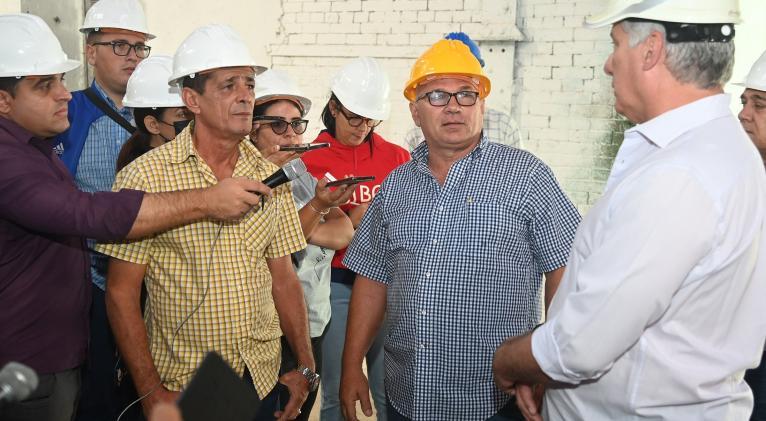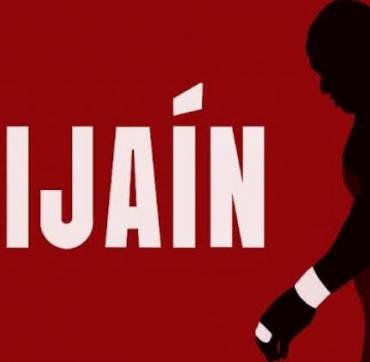Cuba does not accept interference, nor does it renounce building socialism
especiales

Cuba does not accept interference of any kind, our country does not renounce its model of socialist building, which we have to perfect, and the country in the midst of the most difficult circumstances will continue to advance, stressed the President of the Republic, Miguel Díaz-Canel Bermúdez, when exchanging with the people of Lajas, a municipality he visited on Wednesday as part of his usual tours throughout the nation.
After learning about the successful experience of sugarcane producer Luis Alberto Pérez Ortiz on some 80 hectares, while visiting the Ciudad Caracas sugar mill that is getting ready to grind at the beginning of December and touring the neighborhood under transformation La Planta (previously an illegal settlement), the Head of State spoke with several dozen Lajas residents who were waiting for him in front of the municipal Party headquarters.
The president referred to the concern that some people might have with the results of the elections in the United States. He said that “for us, the results of these elections are not new results. It was a predicted scenario. It was a probable scenario, and we had been preparing for that scenario.”
There is a totally asymmetrical relationship (Cuba-United States), recalled the President, because they have imposed a blockade on us for more than sixty years, a blockade that was intensified in 2019, with measures taken by the administration that is now in the White House, and that were maintained with the current one. That is, it is not a problem of administrations.
“Two administrations of different U.S. parties have maintained the same position of hostility towards Cuba.” In this regard, he stated that we have been dealing with our whole life. Hence, the country is prepared.
“We have always stated that we have nothing against the American people and that we are willing to dialogue on equal terms with the Government of the United States,” he confirmed.
On equal terms, Díaz-Canel was emphatic, without impositions, with respect and, of course, without anything that affects our sovereignty or our independence. That is Cuba's stance.
It is true, he acknowledged to the Lajeros, that we have suffered a lot. Cuba has suffered a perverse and genocidal blockade for more than sixty years. In recent years, we have suffered the intensification of that blockade, with the implications it has had on the lives of Cubans, with blackouts, with the lack of food, with the lack of medicines.
But we have the conviction, he added, that with creative resistance, which is not just resisting but creating - as we faced the pandemic, when we were able to overcome it because our scientists achieved the vaccines and our social system focused on saving lives - with that same passion, with that same conviction, with the talent of our people, with the heroism of our people, we will continue moving forward.
Without fear, the President said, confident that with our own efforts, with our own talent, we can succeed.
Precisely that talent and that effort was proven during this trip when he met the sugarcane producer Luis Alberto Pérez Ortiz, with whom he spoke at the edge of one of the vigorous sugarcane fields that are part of his 80 hectares in usufruct, in which he has achieved a yield of 90 tons per hectare.
The farmer, who was previously dedicated to pig production, has been in the world of sugarcane for four years; and he explained to the President that success is in the day-to-day work, in doing things well each day. He is followed in this endeavor by just 6 workers on his farm La Esperanza, where he has ventured into the use of bioproducts.
The Head of State—always accompanied on these tours by Roberto Morales Ojeda, Secretary of Organization of the Central Committee—was interested in the sugar harvest in the province of Cienfuegos, which is crucial for the country, where three sugar mills will be grinding from the beginning of December until March, although the 14 de Julio Sugar Mill jumped the gun and already turned on the boilers and began grinding. This is regarded as the best in the nation.
The agenda then continued at the Ciudad Caracas Sugar Mill, practically ready for its start-up on December 4th. Díaz-Canel acknowledged the preparation carried out on its machinery and insisted on the need for the mills to generate electricity also outside of the campaign.
Together with leaders of the Party, the Government and the sugar sector in the province, he toured the sugar mill, which has a full workforce, which includes 51 young people. The President considered that Ciudad Caracas “is a well-organized sugar mill.” According to the local press, 18,000 tons of sugar should be produced here this year.
The visit to Lajas continued later through the La Planta neighborhood, a formerly illegal settlement, where housing has been legalized, electricity has been provided, communications services have been provided and houses have been rehabilitated. The Head of State spoke with his neighbors about the need for popular involvement.
He was interested in the health services, the corner store, the pharmacy, and the nearest schools. He spoke of the harmony between the neighbors and how it is demonstrated every day that despite the difficult economic situation, progress can be made in the well-being of our people.
Translated by Sergio A. Paneque Díaz / CubaSí Translation Staff














Add new comment